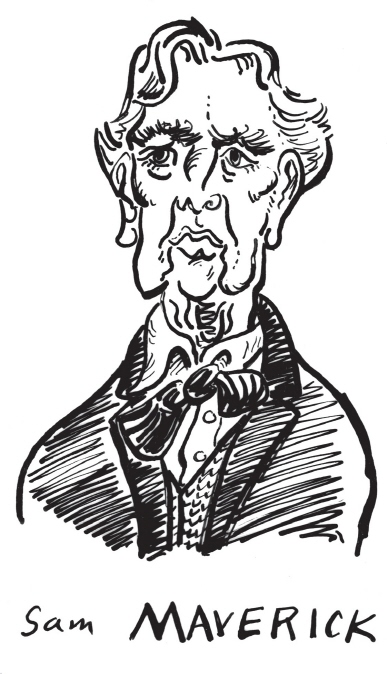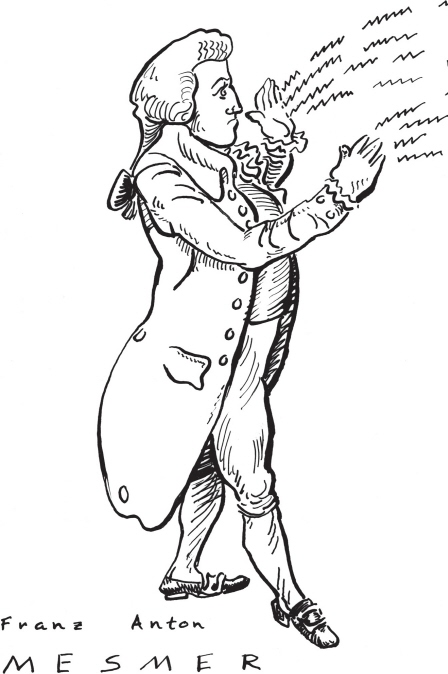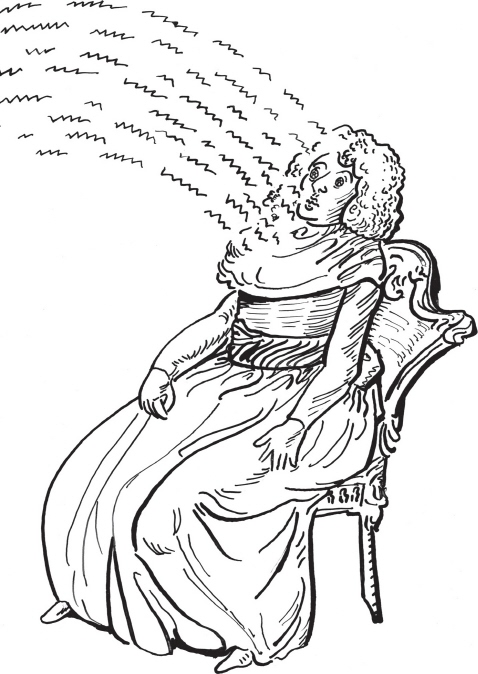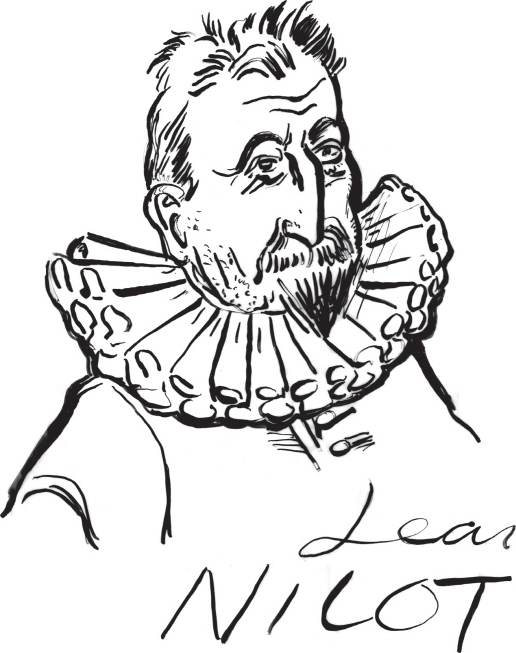Anonyponymous (7 page)
Authors: John Bemelmans Marciano

The building stood for roughly sixteen centuries before being shattered by earthquakes. Soon after, the Knights of Malta scavenged the marble to fortify their nearby castle, took the sculptures they liked to decorate it, and ground and burned the rest into lime. Sadly, all that’s left of the tomb is a bit of rubble, which if you’re interested is somewhere in Turkey. The best of its remaining statuary, like so much of the world’s great art, was carted off during the Victorian era and now sits in London’s British Museum.
mav·er·ick
n. An individual who tends to his own
individuality.
Samuel Augustus Maverick was a Yale graduate, lawyer, Mexican War veteran, and San Antonio mayor who owned so much Texas real estate they named a county after him. In the mid-1840s, Maverick accepted a herd of cattle in exchange for a debt and, not caring much for livestock, neglected them to the point of allowing calves to wander about unbranded, a cardinal sin in the free-ranging days before barbed wire. The lack of a brand became a brand in itself: Whenever anybody found a stray calf with no markings, they said, “That there’s a maverick.” Metaphorical uses soon followed.

A more famous owner of the surname was the fictional Old West hustler Bret Maverick, played by James Garner in an excellent 1950s TV show and by Mel Gibson in a less excellent 1990s movie.
men·tor
n. One who imparts experiential wisdom to those
who have less of it.
When Odysseus departed Ithaca to go fight the Trojan War, he left his young son, Telemachus, in the care of his wise friend Mentor. For the duration of the conflict and Odysseus’ long sea-tossed voyage home, the aged Mentor advised the young prince and helped him fend off his mother Penelope’s legion of suitors.
The mythology surrounding the Trojan War era has resulted in an all-time bounty of eponyms. While terms like
Achilles’ heel
and
odyssey
might still be used with an idea of the events to which they refer, certain words have become so deeply ingrained as to have broken free of their original context entirely, such as with
siren
, the use of which as a device for making noise dates only to the nineteenth century, and
hector
, which evolved from meaning a valiant warrior in the mold of the great Trojan prince to a bully and a braggart, from which it became a verb meaning “to domineer.”
*
Many such eponyms, however, are fading altogether— along with our collective educations. One is
myrmidon
, the name of the race of men descended from ants (yeah,
ants
) who were Achilles’ staunchest supporters, thus any member of an entourage or gang.
Stentorian
derives from the “great-lunged” Stentor, whose voice Homer describes as crying out “with the blast of fifty other men,” while a cassandra, ignored predictor of bad fortune, was coined after the doomsayer none of the Trojans believed.
mes·mer·ize
v. To spellbind or enthrall; to captivate.
Franz Anton Mesmer studied medicine in Vienna, writing his 1766 doctoral dissertation on the gravitational effects of the planets on the body, a theory then in vogue. Mesmer went on to become a successful physician with a unique way of curing people: He would have them swallow a solution of iron, then pass magnets over their bodies to summon an “artificial tide” that helped unblock the free flow of “life fluid.” Blocked life fluid, you see, is bad.


Dr. Mesmer soon discovered that he needn’t resort to outside devices as he had his own “animal magnetism”
*
to get life fluids flowing. After an unfortunate incident with a blind girl, he moved to Paris, where the practice of Mesmerism became a sensation. With a process of laying on hands, hypnosis, and suggestion set to the otherworldly sounds of a glass harmonica (later used in a thousand horror movies), Mesmer produced trance states in his patients that provoked convulsions, the desired “crisis” that uncorked blockages. His mass healings became a happening.
Louis XVI appointed a crack medical commission to investigate Dr. Mesmer, gathering such luminaries as U.S. ambassador Benjamin Franklin, creator of Mesmer’s beloved glass harmonica, and—somewhat ironically for the monarch—a certain Dr. Guillotin. Their verdict:
merde
.
nic·o·tine
n. Addictive substance found in tobacco; also
used as an insecticide.
In 1560, ambassador to Portugal Jean Nicot sent a little something from the New World to the French court back home as a gift: tobacco. Much as they later would with Dr. Guillotin’s suggestion, the French took to the new idea enthusiastically.

onan·ism
n. Masturbation.
Genesis 38 opens with Israelite tribal leader Judah espying a pretty young Canaanite; Judah “took her, and went in unto her,” after which event she conceived Er, and, after another going-in-unto, Onan.
*
When the time came Judah married off his eldest son, but Er “was wicked in the sight of the LORD; and the LORD slew him.” So Judah said to Onan, his second son, “Go in unto thy brother’s wife, and marry her, and raise up seed to thy brother”—meaning, give your dead brother an heir. Onan, while fully on board with the sex part, didn’t cotton to the idea of being stepfather to his own child, so after he went in unto his brother’s wife, he pulled out, and spilled his seed all over the ground. “And the thing which he did displeased the LORD: wherefore he slew him also.”
That’s all we know about Onan. So how is it that the name of this randy and unscrupulous Israelite came to be synonymous with masturbation? That’s where things get weird.
That Onan was killed because he had sex with his sister-in-law under false pretenses seems the obvious reading of Genesis 38, but from early days an alternate interpretation took hold that the Lord was smiting Onan for the wasteful act of spilling seed itself, and therefore any spilling of seed (you get that by “seed” we’re talking semen here, right?) without impregnating intentions was verboten.
Then came
Onania, or the Heinous Sin of Self-Pollution,
and All Its Frightful Consequences in Both Sexes, Considered
, an early-eighteenth-century bestseller that claimed “onanism” was the cause of gonorrhea, blindness, insanity, and stunted growth. It offered as cures “Strengthening Tincture” and “Prolifick Powder,” expensive at ten and twelve shillings apiece, but how can you put a price on being master of your domain? Though transparent quackery,
Onania
piqued the interest of Dr. Samuel Auguste Tissot, a well-respected Swiss medical researcher. After intently studying many young male masturbators, Tissot concluded in his 1760 work
L’Onanisme
that semen was an “essential oil” that, when expelled from the body in unnecessary amounts, caused a plethora of disastrous medical conditions, legitimizing
Onania
and causing boys everywhere to fear that masturbation led not only to eternal damnation but to dis-figurement and death.
Thanks a lot, doc.
WORDS OF BIBLICAL PROPORTIONS
The Bible is our single most fecund source of eponyms. Whether or not these words are anonyponymous depends upon one’s familiarity with the good book, so, with the exception of Onan, these eponyms have been excluded from our main list of entries. But for those of you who never went to Sunday school, here’s a sampling.
Jezebel was the Yoko Ono of the Old Testament, a Phoenician princess who married Ahab, king of Israel, and got him to ditch Yahweh in favor of her hometown god, Baal. For this,
jezebel
has forever after stood for any manner of conniving, shameless, brazen, controlling, impudent hussy.
The Old Testament produced a surfeit of synonyms for
giant
, from
goliath
to
behemoth
, the largest creature on land (thankfully an herbivore) and
leviathan
, the greatest beast of the sea (eating preferences unspecified). A
jeremiad
is a litany of woes and/or complaints, a reference to the prophet Jeremiah’s aptly titled Book of Lamentations. Nimrod was a “mighty hunter before the Lord” in Genesis, yielding the expected meaning of one skilled in the catch, but another use, as a contemptible moron, comes from Bugs Bunny’s sarcastic belittling of Elmer Fudd. Bugs also popularized another O.T. eponym,
methuselah
, meaning a really old guy, after the great-great-great-grampa of Nimrod, who lived to the ripe old age of 969.
The New Testament gave us a doubting Thomas and a good Samaritan, plus a not-so-good Samaritan, Simon Magus, the first heretic;
simony
is the buying and selling of church offices. A
judas
needs no explaining, but how Mary Magdalene came to be an eponym does.
In Middle English Mary Magdalene was called Maudelen, and she was most often depicted weeping piteously over the dead Christ. Then, as now, there were lots of sentimental old drunks across England, and when they began to cry into their beer they were said to be acting all Maudelen, which is to say,
maudlin
.
pan·der
v. To cynically cater to another’s interests.
The character from whom this term originates has a long and varied history on the margins of great literature. In Homer’s
Iliad
, Pandarus was a Trojan archer who played a pivotal role in the conflict, breaking a truce with the Greeks by firing off a hasty arrow. The medieval romance of Troilus and Cressida, however, found Pandarus performing a rather different function.
First, about Troilus. He was the little brother of the Trojan princes Hector and Paris, known mostly for having been really good-looking and getting whacked by Achilles. Homer mentions his name only in passing. In the Middle Ages, however, this bit player suddenly became the protagonist of a great love story. No longer just some pretty boy, Troilus valiantly battles Achilles, wounding him, and even routs his fearsome Myrmidons. The crux of the drama is Troilus’s love for Cressida, who is being held prisoner by Troilus’s father, Priam, in retaliation for her father’s desertion. Troilus needs someone to help him get to Cressida. Enter Pandarus.
Pandarus is Troilus’s friend and the uncle of the imprisoned Cressida; taking pity on the lovesick Trojan prince, Pandarus acts as Troilus’s go-between in wooing the girl. At least, this is how the story went by the time the twelfth-century
Roman de Troie
got retold by Boccaccio (1330s) and re-retold by Geoffrey Chaucer, from whose
Troilus and
Criseyde
(1380s) the name popularly entered our language. A “pandare” meant a helper in secret love affairs, but the term soon took on a more negative, pimplike connotation, so much so that when Shakespeare wrote
his
version of
Troilus and Cressida
(c. 1602) he made Pandarus a cynical degenerate merrily willing to procure his niece for the Trojan prince. The Bard also endowed the character with a remarkable degree of self-conscious prescience: